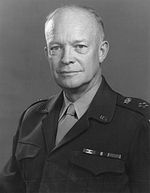Citizens for Eisenhower
|
|
|||||||||||||||||||||||||||||
|---|---|---|---|---|---|---|---|---|---|---|---|---|---|---|---|---|---|---|---|---|---|---|---|---|---|---|---|---|---|
|
|||||||||||||||||||||||||||||
|
All 531 electoral votes of the Electoral College 266 electoral votes needed to win |
|||||||||||||||||||||||||||||
| Turnout | 63.3% |
||||||||||||||||||||||||||||
|
|||||||||||||||||||||||||||||
|
Presidential election results map. Red denotes states won by Eisenhower/Nixon, blue denotes those won by Stevenson/Sparkman. Numbers indicate the number of electoral votes allotted to each state.
|
|||||||||||||||||||||||||||||
|
|||||||||||||||||||||||||||||
Dwight D. Eisenhower
Republican
The United States presidential election of 1952 was the 42nd quadrennial presidential election, held on Tuesday, November 4, 1952. Republican Dwight D. Eisenhower won a landslide victory, ending a string of Democratic Party wins that stretched back to 1932. He carried the Republican Party (GOP) to narrow control of the House and Senate. During this time, Cold War tension between the United States and the Soviet Union was at a high level, as was fear of Communism in the US, epitomized by the campaign of McCarthyism. Foreign policy was a main issue in the race for the Republican nomination. The nation was polarized over the stalemated Korean War, and the extent of corruption in the federal government became a major issue as well. The economy was prosperous and economic and social issues played little role in the campaign.
Incumbent President Harry S. Truman, having been knocked out of the race by a poor showing in the early primaries, decided to back the Governor of Illinois, Adlai Stevenson. Stevenson had gained a reputation in Illinois as a reformer and intellectual; however, he had vacillated a great deal on whether he even wanted to run for the presidency. President Truman had several meetings with Stevenson about the President's desire for Stevenson to become the standard-bearer for the party. Truman became very frustrated with Stevenson and his high level of indecision before Stevenson actually committed to running. The Republican Party saw an intense battle for its nomination contest between the senior Senator of Ohio, Robert A. Taft and Eisenhower. The issue was foreign policy, with Eisenhower supporters attacking Taft as too isolationist. Taft saw little role for the United States in the Cold War. Eisenhower, the former NATO commander and war hero, narrowly defeated Taft. Eisenhower then crusaded against the Truman policies he blasted as "Korea, Communism and Corruption." Eisenhower did well in all major demographic and regional groups outside the Deep South.
...
Wikipedia




